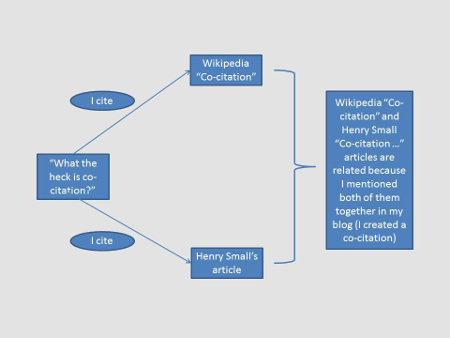What the heck is co-citation?
Some SEO gurus think that co-citation in content is the wave of the future. Moreover, they’re saying that traditional keyword anchor text is on its way out. Maybe.
We haven’t heard much about it in the copywriting circles here in Houston.
So what the heck is co-citation?
Wikipedia, in the article “Co-citation”, uses Henry Small’s 1973 article “Co-citation in scientific literature: a new measure of the relationship between two documents” to define co-citation as
“the frequency with which two documents are cited together by other documents. If at least one other document cites two documents in common these documents are said to be co-cited.”
In other words, because I referred to a Wikipedia’s co-citation article and Henry Small’s co-citation article in my co-citation blog, Wikipedia and Henry Small must be about the same thing – co-citation.
For those of you who like visuals, co-citation in content can be explained like this

Notice that co-citation can be done with or without hyperlinking. Many SEO gurus believe that search engines like Google are beginning to give anchor text links less weight.
Why? Because of all those shady bait and switch tactics some folks have used in the past. Apparently, the folks at Google have created smarter algorithms that give these websites serious demotions.
Why you should ever use co-citation in your content articles and blogs? It only creates a relationship between the sites you reference. So what are the benefits to your site?
If you’re following the SEO forums, the benefits to your site are two-fold. Firstly, you are creating external references in your content to other authorities. Secondly, you are providing incentive for other sites to link to your articles and blogs.
If you remember back to your school days, you recall that you had to cite references on the papers that you turned in. Properly citing your sources was drummed into your head. Why?
Because authoritative sources gave your paper credibility. You needed to show that you had properly researched the subject and were well-acquainted with the topic. You weren’t allowed to use non-authoritative sources in your bibliography because doing so led to your own authority being questioned.
You work hard to get quality, inbound links to your website. The more inbound links you get, the higher search engines perceive your authority. They reward you in organic search results and page rank, which (hopefully) results in more traffic to your site.
You can’t overlook the power of outbound links. Outbound can help you get more inbound links if you find high quality, relevant material from sites that are established authorities. Reference materials that enhance your own writing produce a heightened visitor experience and the search engines will reward you for this.
Look at it this way, if you co-cite a non-competing high quality, yes, you are helping them. The flip side is that someone at that company who is watching where the inbound links are coming from might like some of your material, and co-cite your content.
Co-citation is worth a try. In the long run, it won’t hurt your site, provided your outbound citations are to other non-competing authorities who also link or reference still other experts. Remember to watch your metrics, and then make your decision if co-citing is worth all the hype.
(Directory One is a Houston SEO firm specializing in content management. Give them a call to get your strategy on track.)
